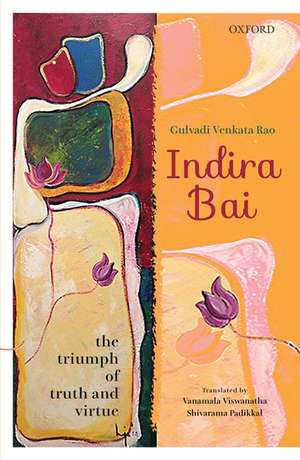Indira Bai: The Triumph of Truth and Virtue
Autor Gulvadi Venkata Rao Traducere de Vanamala Viswanatha, Shivarama Padikkalen Limba Engleză Paperback – 15 aug 2019
Preț: 164.22 lei
Preț vechi: 214.57 lei
-23% Nou
Puncte Express: 246
Preț estimativ în valută:
31.42€ • 32.74$ • 26.02£
31.42€ • 32.74$ • 26.02£
Carte disponibilă
Livrare economică 03-08 martie
Preluare comenzi: 021 569.72.76
Specificații
ISBN-13: 9780199492855
ISBN-10: 0199492859
Pagini: 304
Ilustrații: NA
Dimensiuni: 140 x 214 x 17 mm
Greutate: 0.25 kg
Editura: OUP INDIA
Colecția OUP India
Locul publicării:Delhi, India
ISBN-10: 0199492859
Pagini: 304
Ilustrații: NA
Dimensiuni: 140 x 214 x 17 mm
Greutate: 0.25 kg
Editura: OUP INDIA
Colecția OUP India
Locul publicării:Delhi, India
Notă biografică
GULVADI VENKATA RAO (1844-1913) is acknowldeged as the first Kannada novelist who wrote on social issues. While he also authored four other novels including 'Bhagirathi' and 'Ladupriyacharya', it was 'Indira Bai' that brought him into the limelight. Born in Kundapura, South Canara, he was educated in Mangalore and Madras, and he later served as an officer in the Police Department. The author hailed from the progressive Saraswat community which provided the immediate context for social critique in his novels.VANAMALA VISWANATHA has taught English language and literature over the past four decades at several premiere institutions in Bengaluru. Viswanatha has also worked as Honorary Director, Centre for Translation, Sahitya Akademi, Bengaluru and as a member of the Advisory Committee, National Translation Mission.She has translated and introduced Sara Aboobacker's Kannada novel ('Breaking Ties', Macmillan India,2001) and an anthology of Lankesh's short stories('When Stone Melts', 2004, Sahitya Akademi), and co-edited 'Routes : Representations of the West in Short Fiction from South India' (Macmillan India,2000); and translated J Krishnamurti's writing into Kannada. She has co-translated Ananthmurthy's Samskara into Swedish ('Samskara - rit for en dod man', Ordfront Forlag, 2001) and Torgny Lindgren's Swedish novel into Kannada ('Havina Donku',2002). Her translation of 'The Life of Harishchandra' ( Harvard University Press, 2017), the first ever translation of a medieval Kannada classic, in the Murty Classical Library of India Series, is considered a landmark publication.SHIVARAMA PADIKKAL teaches at the Centre for Applied Linguistic and Translation Studies (CALTS), University of Hyderabad. His research interests include Modern Kannada Literature, Translation Studies, Cultural Studies and Comparative Literature. His book on nation, modernity and the rise of the Kannada novel, 'Naadu-Nudiya Roopaka' is much acclaimed.
